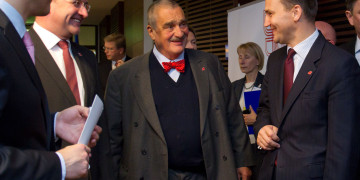Trends of Czech European Policy: Study of European Policy Elites
Read the study Trends of Czech European Policy: Study of European Policy Elites to obtain the results in the most complex form.
The publication of this book was possible with kind support of Konrad-Adenauer-Stiftung Prague.
The publication includes:
- graphs and visualizations commented by the author,
- executive summary,
- note on methodology and conduct of the survey,
- note on the sample of respondents.
Main findings:
- According to Czech European policy elites, the Czech Republic is not capable of either formulating or asserting its interests in the EU. However, they expect an improvement in this situation over the next ten years.
- The main benefit of membership is access to the Single Market.
- A key issue for the Czech Republic will be developments in the eurozone, which will continue to expand and integrate both economically and institutionally.
- The European Union will follow the path of variable geometry. Fundamental institutional reform and a revision of primary law is not expected. The European institutions whose influence will strengthen most will be the European Central Bank and the Court of Justice of the EU.
- The Czech Republic’s closest allies in the EU are Slovakia, Germany and Poland.


